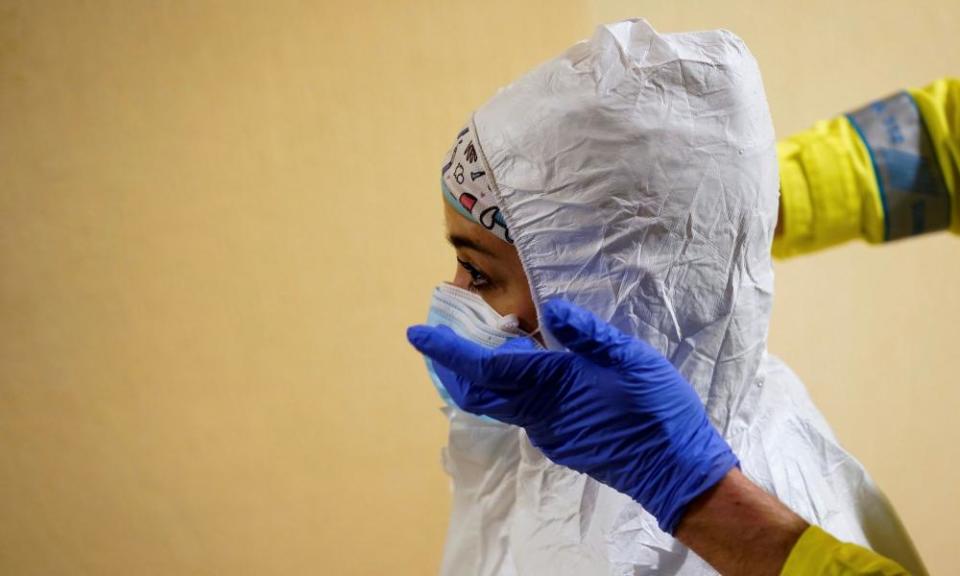Global report: record Covid cases and new lockdowns across Europe

Regions in Spain and Italy have returned to lockdown and Ireland will do so from Wednesday as countries across Europe continue to report new Covid infection highs and governments struggle to contain the second wave of the pandemic.
The northern Spanish Navarre region, where the number of cases per 100,000 people is 945 against 312 nationally, announced a two-week lockdown from Thursday that will be stricter than measures imposed on Madrid by central government.
People will only be allowed in and out of Navarre for work, university studies, to care for relatives, or for emergencies, the regional government said. Restaurants, cafes and bars will be closed, while shops may open at 40% capacity but close by 9pm.
The lockdown in and around the capital, the source of bitter arguments between the central and regional government, is due to expire this Saturday amid media reports that the regional government is considering the introduction of a curfew.
Central government said on Tuesday it too was considering curfews to tackle a nationwide rise in daily cases that reached 38,000 on Monday.
Imposing a curfew in Madrid and possibly beyond would require invoking a state of emergency, health minister Salvador Illa said, adding that a period lasting more than two weeks would require the support of some opposition parties.
Ireland is set to become the first EU country to return to lockdown, the taoiseach, Micheál Martin, confirmed late on Monday, issuing a nationwide “stay at home” order but insisting schools will stay open.
The measures come into effect for six weeks from midnight on Wednesday and will see all non-essential retail businesses close, bars and restaurants limited to takeaways, and people required to stay at home with a 5km travel limit for exercise.
In Italy, the southern region of Campania said it would ask central government to give permission for a night-time curfew from this weekend, after the northern region of Lombardy got the green light for a similar 11pm to 5am lockdown from Thursday.
Unlike when the epidemic first struck in March, the prime minister, Giuseppe Conte, is looking to give towns and regions more leeway to decide their own curbs as infections rise around the country.
Local officials in both regions warned their health systems risked being overwhelmed, with the mayor of Naples saying Campania had just 15 intensive care beds left and experts predicting ICU admissions could leap from 100 to 600 in Lombardy.
Poland’s parliament, meanwhile, postponed an emergency debate on new rules to boost the number of medics available to treat Covid-19 cases and make wearing face masks in public legally binding, after opposition parties demanded clarifications.
Doctors have demanded more support for the health system after reports of patients dying when ambulances couldn’t find a hospital to admit them. Poland reported 9,291 new infections on Tuesday, its second highest daily figure.
Hungary is also holding back on new measures despite growing criticism of the response of Viktor Orbán’s government. During the first wave, Hungary recorded relatively low numbers of infections and deaths.
This month, however, more Hungarians have died of coronavirus than in the previous four months put together. According to the European Centre for Disease Control (ECDC), the country currently has the third-highest rolling seven-day death rate per million in the bloc, behind the Czech Republic and Romania.
Russia recorded a record high of 16,319 new cases on Tuesday, including 4,999 in the capital Moscow, while Germany is putting the Bavarian municipality of Berchtesgadener Land under lockdown from 2pm on Tuesday.
Schools, nurseries and restaurants closed and residents are confined to their homes unless they have a legitimate reason to be out. The local lockdown, the first of its kind in Bavaria since April, came as the municipality reported the highest seven-day incidence of Covid-19 in the country, with 2,728 new infections per 100,000 residents.
The federal government has insisted it will try to avoid a second nationwide lockdown at all costs, but some officials have in recent days proposed cordoning off regions to contain the spread of the virus.
Lothar Wieler, the head of the German disease control agency, said last week that while cordoning off entire districts had seemed “unimaginable” to him nine months ago, he could now see some states taking such a step.
Greece scrapped a plan to allow a limited number of spectators back into sporting events, the prime minister’s office said on Tuesday. “Conducting the games even with a few spectators … would send a wrong message to citizens,” it said, after the country registered 438 new Covid-19 infections on Monday.
Beyond Europe, Iran’s daily infections surpassed 5,000 – a new record. There were also 322 new deaths. The president, Hassan Rouhani, said the worst-hit country in the Middle East was now “facing a larger wave of the virus” than earlier in the year.

 Yahoo News
Yahoo News 